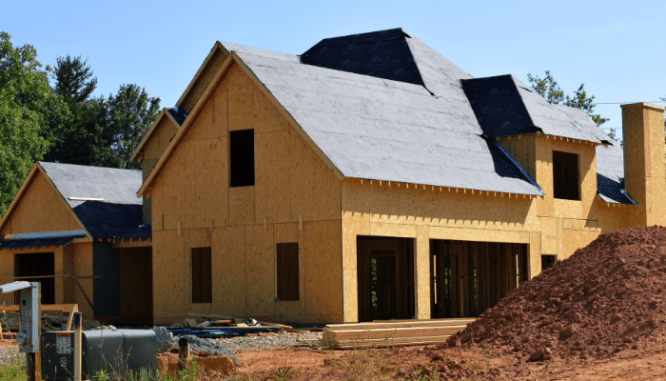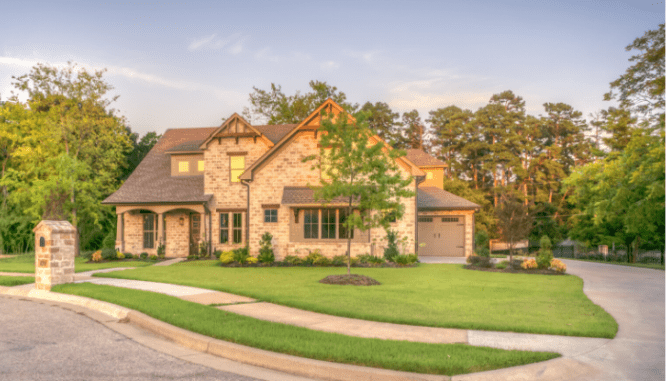I’m Buying a Brand-New Home: Will It Hold Its Value?
- Published on
- 5 min read
-
 Morgan Donohue Contributing AuthorClose
Morgan Donohue Contributing AuthorClose Morgan Donohue Contributing Author
Morgan Donohue Contributing AuthorMorgan Donohue has worked in both real estate and interior design, and she uses her experiences to write all about buying, selling, and adorning a home. When she isn't writing, she is often traveling and finding adventure.
There is something to be said about walking into your own home for the first time, and if you combine that elation with a brand-new home that no one else has ever lived in before, it’s easy to see why so many buyers see the appeal to owning a brand-new home. But appeal isn’t enough: For so many buyers, the question remains, which is better for your bank account? Buying a brand-new home or buying an older home?
The answer is: It depends. Let’s breakdown the nuances and the pros and cons that come with buying a brand-new home.

A new versus ‘existing’ home
Most homes on the market are being sold by a current owner; They have been lived in, and many have had multiple owners. These homes are considered established or “existing” homes. While an existing home might come with a substantial price tag, it won’t be as expensive as a brand-new home. This is because they haven’t been recently built from the ground up, nor were they built with 2020 labor rates.
Top agent Emma Payne is located in the Sussex County area of Delaware and has more than 39 years of experience in real estate. When it comes to price, she explains, “It’s really important to sit down with an agent that can look at your finances, look at your bottom line to help you understand the value of the new construction versus the old construction.”
Is the price right?
The price of an older home is mostly reflective of the current market and the overall quality of the home. The price of a new home is reflective of the market as well as the cost to the builder to deliver a finished home.
With an older home, you will be able to tap into the owner’s historical knowledge of the monthly and annual costs that come with owning that particular home. Taxes, insurance, utilities, homeowers association (HOA) dues, and more can all be predicted and help deliver a more accurate budget for your financial planning throughout the year.
Alternatively, a new home’s costs and how they will affect your budget might be no more than an educated guess by a builder or developer because there aren’t historical records regarding what it will require to maintain your new home.
Upfront versus lifespan costs
A newer home will have a higher upfront cost in its asking price, but with that comes a certain level of guarantee that everything in the home is also new and will incur little to no cost to maintain for a few years — and many new homes come with warranties.
Alternatively, with an older home, much of your home inspection will involve assessing the lifespan of things like your roof, water heater, kitchen appliances, and plumbing. It’s more likely that these appliances and systems won’t have a valid warranty. As a homeowner, it is important to determine where you want to spend more — upfront or over the long term.
Customizing your home to fit your needs
If you want to be able to dictate the layout of your home, the level of the finishes, and add any customization to the home prior to moving in, new construction will be a good choice for you, especially if you buy the home before it is completed. You can dictate the flooring, interior paint color, light fixtures, and more in a home that is being built specifically for you. That said, you’re going to be paying more per square foot for a new home than you would an existing home.
On the other hand, pay attention to how each upgrade or finish choice will affect your budget. It can be easy for the small details to add up quickly, and you do not want to price yourself out of a home you have fallen in love with before it is built.

When new construction will hold its value
New construction homes cost more upfront than existing homes, but there are plenty of times when your new home will hold its value.
When you’re staying for some time
First, think about how long you intend to stay in the home. If you expect to stay for only a year or two, the market may not have time to catch up to the home’s elevated price. If a new home is overpriced (compared to existing homes) in the current market, staying put for a few years and allowing the market to catch up as your new home becomes an existing home is one of the best strategies for you to consider.
When you either bought one of the first homes or one of the last homes in the development
Being one of the first to buy into a development is a great strategy for getting a good price point on a home. One component of being in a new development is the construction of other homes in the neighborhood. Developers acknowledge the activity and noise from construction by reducing the price of those first few homes. As Payne explains, “Being the first into a new construction site is absolutely the best value, because they are going to add a lot of incentives to make up for the noise that might be around you.”
Alternatively, selling every lot can take longer than the developer anticipated, and when they’re trying to offload the very last of the bunch, buyers have two advantages. First, the price might reflect the builder’s desire to move those last few lots, and you will also be able to see how the development looks when it’s almost complete. You will see a sense of the culture, what sort of community you can expect, the amenities — and you won’t have the construction distraction of other new homes popping up around you.
When you DIY as much as possible
If you are handy, or you have construction know-how, doing it yourself can really add value to your home and keep costs down. Consider installing the kitchen backsplash or shower surround yourself, rather than having the builder do it. If you have the skills, ask the builder to do the minimum level of finishes in order to sign off on the house, and then make the upgrades yourself. You can boost your home’s value without having it impact your mortgage statement.
When you keep the decor neutral
If you know that you will sell this new home in a couple of years, keep the level of finishes and the overall decor neutral enough for an easy resale. If you add custom finishes or wall colors that fit your unique style, you will either be spending money changing it before you put the house on the market or accepting a lower asking price.
When the neighborhood is growing
If the amenities outside of your development are showing signs that your area is thriving — great schools, new businesses, it is becoming a destination for recreation, and so on — that is a good sign that home values in your area are increasing, and your home might be in a good spot for you to sell.
When the market is soaring
If the local real estate market is taking off, and you’re hearing the words “seller’s market” consistently, your home has the potential to accrue increased equity. This means that the gap between what you owe on your home and the market value of it has grown, giving you more equity at your disposal. The two ways to increase your equity is through paying down your mortgage, or living in the home long enough to see a positive shift in the market and the value of your home going up.
When the level of neighborhood amenities is very attractive
One of the biggest challenges developers face is creating a community around a new place and with new neighbors. As a response, developers have been adding amenities to their projects. Payne has seen zero-entry pools, gyms, community centers, gaming areas, recreation centers, playgrounds, open spaces, trails for walking and bikes, accessible features, and more.

When new construction does not hold its value
The flip side of the new construction coin is that there are times that a new home does not hold its value.
When you have to sell shortly after you buy
The value of a new construction home might shift in the first year of your purchase, simply because with a previous owner it is no longer “new construction” but has shifted into the existing-home category — and if people are still able to shop in your neighborhood for empty lots on which they can build their dream home for about the same price you’re asking for your place, you’re not going to see the market catch up with your home’s value for some time.
When you had the builder make all of the upgrades
The expensive upgrades you might have added throughout your home will have increased what you paid for the home, but it may not hold the value that you paid for it. That’s especially true because the ease with which you can upgrade items in your home with a builder comes at a premium price.
If you are willing to wait on the tile backsplash or updated light fixtures until after your home is built, you will have more options to choose from, and it will be much more cost-effective. The savings and ability to choose the style of the upgrades holds true even if you hire your own contractor to do the work.
By going with the builder to max out your upgrades, you’re spending money excessively, and you’re also running the risk that buyers might not share your tastes, or your choices might not hold up to current trends. You might even find yourself updating some of your upgrades before you sell.
When you customize to your tastes
Neutral decor is the best bang for your buck in resale, and if you designed the home to fit your custom needs, it might not reflect what the new buyer needs.
When there are problems in the home not covered by a warranty
A builder often offers a 10-year warranty; If there are problems that are not covered by that warranty, you might have to pay to fix them before selling.
When the neighborhood shifts
If the school ratings decrease, taxes increase, or the crime rate is no longer as low as it once was, these things beyond your control can be problematic when you try to sell a home.
When the market shifts downward
If it becomes a buyer’s market, where there is a lot of inventory to choose from; The other homes in the area are nicer than yours; Or your home is priced too high for the area comparable sales, you will need to reassess your decisions to better accommodate what the market is telling you.
In the end, will your new construction home retain its value? It ultimately depends on the decisions you make when you build and when you decide to sell. The best thing you can do is talk to your agent to figure out how to maximize the financial investment you make into your new home.
Header Image Source: (Christopher Burns / Unsplash)
